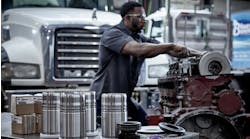In less than two years, 31-year-old dealer Boyd Suftin has managed to make it into Cornwell Quality Tools’ Top 100 list.
The Madison, WI dealer has been able to use his youth to his advantage, allowing him to understand the needs of the new generation of technicians.
Sutfin’s Madison route consists of mostly automotive dealerships and independent repair shops on the west side of Madison the first half of his week, rounded out by heavy duty trucking and equipment shops north of the city on Thursdays and Fridays.
This former construction worker, who admittedly had little career direction as a young man, speaks to the opportunity mobile tool sales offers someone with a good work ethic and strong business instincts.
Growing up, Sutfin worked at his father’s family-owned automotive repair business.
“I grew up in a body shop. I got all my knowledge about the tools and everything – I was a grunt there.”
But after high school, he didn’t have direction on what he wanted to do professionally. He ended up working for a pipeline construction company where he specialized in directional drilling.
“I had no idea what I wanted to do … I didn’t know what I wanted to do with my life at all,” says Sutfin.
Sutfin gained more knowledge on tools and equipment working for the construction company. But he was on the road so much, and he didn’t find the job fulfilling. He then began working closer to home for Ashland Tree Experts, trimming trees near power lines.
After seven years of trimming trees, Sutfin was on the lookout for a career that would offer him the same financial opportunities, but be less physically taxing on his body.
That’s when he was introduced to Cornwell Quality Tools.
Sutfin’s father, John, began to seriously pursue a career shift as a Cornwell dealer in the spring of 2012. Boyd happened to stop by his father’s house on the day his dad was meeting with a Cornwell representative to learn more about business opportunities. (John also runs a route on the east side of Madison.)
“I just sat there and listened, and realized it might be a good idea,” says Sutfin of becoming a Cornwell dealer. “We checked into it a bit more and it ended up being a deal.”
Now after 18 months on the job, Sutfin says he has definitely made the right decision.
“I love it. It was a really good move,” says Sutfin. “And I can see the future.”
During the 2014 Cornwell Tools Rally, Sutfin will receive his first ring, given to top Cornwell dealers in the country. In 2013, Sutfin placed 66th out of 100 dealers nationally. He will also take honors as the top dealer in Wisconsin.
Approaching the younger generation
A big part of Sutfin’s game plan is to build a younger technician customer base.
Sutfin explains that he sees his age as an advantage, being only 31 years old himself.
“I’m young. And I (like to) joke with those guys a little,” says Sutfin. “I’m not an old guy just getting into it. These younger guys, (they can start thinking) ‘that’s my dealer for the rest of my life.’”
And you can see how he relates to the younger techs in the shops.
At some stops, groups of younger technicians crowd around Sutfin to see the tools he has carried in his tote. They appear just as eager to hear about the tools as Sutfin is to present them.
Sutfin has also been involved with his local high school, by purchasing goods like cheese and beef sticks from FFA (Future Farmers of America) fundraisers that he has given back to customers as thank-you gifts. He hopes that just having that brand presence around these younger students will help him recruit future Cornwell customers.
“Those people are going to high school, and then I’ll see them at the college, for their John Deere program. Then I’ll see them back at the dealerships. So they have that whole Cornwell idea in their head for the future.”
Know what they need
Sutfin has a passive sales approach. He’s not at all pushy. He focuses more on being relatable with the customer, and doesn’t like to pressure his customers into making a purchase.
“I get along with everybody, but the younger kids are more excited to buy. They need the stuff,” says Sutfin.
He said he enjoys trying to figure out the different strategies for how to sell to different customers, and by figuring out the tools his customers need.
“You have to remember what they need, and what they don’t need. What they already have. Stuff like that, so you don’t keep bringing in the same thing.”
Sutfin makes it a point to tell customers about specials when he remembers a customer’s want or need for a particular tool.
“The biggest thing is just being honest with them, and trying to help them out,” says Sutfin about his customers. “I tell them, ‘I’m here to help you out. I’m here to be your tool dealer for the rest of your career.’”
Sutfin finds the most opportunity with truck stops – which include anywhere from medium duty through Class 8 facilities, trailer equipment, construction and cold transportation (reefer) repair. In addition to the regular gamut of tools an auto repair tech might need, these heavy duty shops require a more extensive array of tools to have on-hand.
“I like the truck shops more. They need everything, from the little screwdrivers to the two-inch tools. They’ve just got such a big box to build,” says Sutfin.
The diesel technicians and heavy duty customers, Sutfin says, “Do everything the car guy does. But the car guy doesn’t need everything the truck guy does. (Truck guys) need everything from 1/4-inch to 3/4–inch, or one-inch impacts.”
He also says heavy duty techs need larger wrench sets – in both metric and standard, as well as different sized tools like pry bars. “They need everything from a small pry bar to a six-footer.”
“It seems like, the bigger the (piece of equipment) they’re working on, the bigger tool they need.”
At heavy duty and automotive stops alike, Sutfin has adopted the approach to help younger technicians buy tools that the veteran techs have in their boxes.
“Most of the truck mechanics learn what the old guys have, so I bring that stuff in for the young kids.”
Sutfin also looks to provide specialty tools when customers need them.
“Some guys have every tool out there. It’s hard to sell those guys stuff,” says Sutfin. “But, they will buy the specialty (tools).”
When customers need something from Sutfin, he readily communicates with them via phone calls and text messages using his iPhone smartphone. Sutfin also wears a Bluetooth headset to take calls while on the road.
He has a Wi-Fi-enabled computer to research products for customers, and to keep track of customer transactions and orders. A laser printer on the truck allows Sutfin to provide every transaction with a receipt.
And after every single transaction Sutfin makes? He says “thank-you” to every customer.
By the book
At the beginning of each month, Sutfin delivers flyers to all of his customers – either handing them directly to the technician, or by placing them on any number of toolboxes throughout the shop.
One thing that’s interesting about Sutfin’s technique is his ability to have all of the technicians at the shop approach him to see what kind of deals he has in his tote for that day.
He totes and promotes at the majority of his stops, and his primary selling is done inside the shop. He’ll place tools he has on special in the tote. And when he sells those products, he’ll fill the tote with other items from his truck. At every stop, he’ll present each tool in the tote – including the name, features and price – for listening customers.
Sutfin tries to answer any customer questions by providing immediate responses. This means he’ll make a call right at the shop, or in his truck while he’s still at the stop.
At one shop, the manager inquired about a new cover for a scan tool cart. Sutfin readily called his Cornwell contact to confirm what he could offer. At another shop, a lead tech asked if Sutfin could replace the covers of three creepers used by the entire staff at the shop. Sutfin made the call right then and there.
A knack for collections
Another key to Sutfin’s success is his knack for collections. At every stop, techs hand over payment in cash, check or by providing their credit card (yes, the physical credit card), to make weekly payments.
When asked how Sutfin has trained his customers to provide payments so readily, he said his district manager had asked the same question – but it’s just something he started when he got into the business. He doesn’t normally offer up things for sale until he’s made these weekly payment arrangements with customers. Sutfin also is careful about extending credit, especially on higher ticket items.
“I think at first, I got that initial thought through, ‘Hey, I’m here to collect money and sell tools, but I want my money first.’”
“A lot of those guys, I don’t worry about, but there are a few out there that you have to get money from them (before you sell to them).”
Beyond ensuring his customer’s weekly payments by running the physical credit card, Sutfin says there’s another advantage.
“I try to get their actual credit cards, because it’s cheaper for me to push (the payment) through. Only by a few cents. But if you do that all week long, it adds up. My credit card bill for running cards … I try to do that to save money.”
He does prefer cash or check, but credit cards “are the only way you can get your money sometimes.”
Looking toward the future
When first starting out, Sutfin found he had to fine-tune the balance between money on the street and the sales he was making. This included the amount for each customer’s weekly payments, compared to their balances when they would make additional purchases.
“I got myself in trouble when I first started. You have so much money on the street, (but) you don’t want to raise (the weekly payments).”
His solution to handling this issue has been to continue and take payments from these techs with higher balances, but he’ll avoid pitching product deals to these customers.
That’s not to say he won’t sell to them – if a technician is in need of a tool, Sutfin is still ready and willing to help out. But he makes it a point to not over-extend his customers’ balances, which he says is to their benefit too, because they won’t continue to increase their weekly payments.
For dealers just starting out, Sutfin offers this advice: “Watch your money when you start. Don’t just buy everything that you think is cool, just because you like it. That’s what I did when I first started. Then it sits on your truck forever,” says Sutfin. Of the tools he now stocks: “It’s not what you want, it’s what they want.”
He also suggests preparing for two key seasons during the year: the holidays, and the tool show.
Sutfin says it’s important to run down inventory on the truck before these two seasonal times.
“I would try not to order as much for the truck. You still have to order some stuff, don’t order for your truck.”
During the holiday season, not as many customers are buying. “Your customer count comes down. They say they don’t have the money because of (buying) Christmas presents,” says Sutfin.
He also offers this advice when purchasing before the annual tool rally.
“Don’t buy anything for your truck about a month before. Unless you need to order something for somebody. It’ll get pretty bare in here (the truck). The older dealers taught me that.”
He now understands the importance of saving space for the extra product he’d get at the show: “I realized, I could spend $4,000, and get $8,000 worth of tools.”
When asked where Sutfin sees himself in five years, he says, “Hopefully in a bigger truck,” smiling.
“It’s a fun job. I like it, “says Sutfin. But, he adds, “It’s not easy.”
“Some people just think that it’ll be a cake walk.”
Boyd Sutfin – Top 5 Tools
- Cornwell CAT4150 1/2” Super Duty Impact
- Cornwell CAT2150 3/8” Super Duty Impact
- Streamlight Stylus Pro Flashlight
- Cornwell CBSMTH62S 62-pc 1/4'', 3/8'' and 1/2'' drive Master Deluxe Star/Hex Bit Set
- Cornwell ECXL1200 600 lumen Rechargeable Worklight




